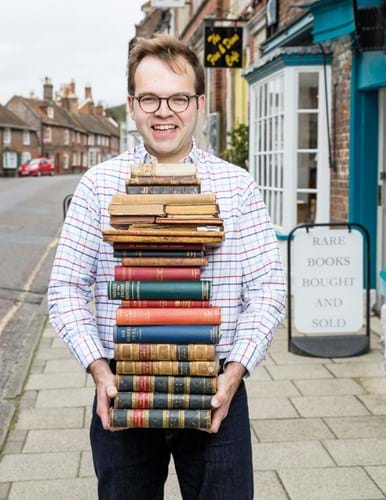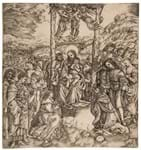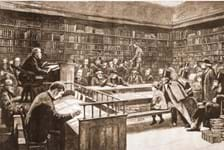The 30-year-old social media fan looks somewhat incongruous in a casual shirt while surrounded by shelves of books in a Georgian building in the sleepy Dorset town of Wareham.
Nestled among the tea shops, butchers and traditional pubs, his Antiquates book store is that modern-day miracle: a book shop recently opened in a traditional high street.
Across a decade, the number of independent book shops in the UK has shrunk from more than 1500 to less than 1000. But this jovial Oxford history graduate is one of the new breed: an optimistic dealer.
“It was nice to bring rare books back on to the high street again,” he says. “The trade has faced increasing rents, rising rates and changing tastes. But it really does seem resilient.”
Last August he opened the shop and in June he will celebrate a decade in the antiquarian book business.
Growing up around Poole in the 1990s, a passion for books took hold in his youth when he used to read by “torchlight under the blankets after bedtime”. As a teenager he took to browsing the shelves of a second-hand book store in Bournemouth. The owner eventually offered him a job as he “was spending as much time in the shop as he was”.
He ended up being paid in books “because there were so many I wanted”.
It was there he met his friend Paris Austin Wells, who now mans the shop in Wareham (Lintern-Mole’s mother is also an employee, in charge of packing).
While at university Lintern-Mole would spend his summer holidays in the Bournemouth shop learning how to value and buy books from customers. However, his passion for the deal took hold when he discovered Mallams’ Oxford auction house.
“I started buying more and more and realised I could start a business by buying at auction and selling online – first on eBay and later via AbeBooks,” he says. After a year he was able to fund a summer holiday InterRailing around Europe.
The 2008 financial crash at the time of his graduation proved something of a silver lining. In pursuit of a ‘proper job’ Lintern-Mole wrote to firms in the City but was told there were no vacancies.
“Getting a job didn’t seem viable so quickly my hobby became my job,” he explains. Running the business from his parents’ garage with a “bit of luck and good timing”, he was able to make a living.
“I want to show the public how affordable rare books can be”
Auction room visits – “intimidating at the age of 21” – meant he could build up a network of contacts. “Once I had bought a few items people started to warm to me. Porters would say hello and some of the dealers would begin to chat. One of them invited me to lunch and if I had a question they were happy to offer advice.”
Lintern-Mole became a member of the Antiquarian Booksellers’ Association (ABA) in 2014 and first exhibited at the Olympia fair in 2015. He now manages the annual Oxford book fair for the PBFA.
Although he started Antiquates online, he decided this wasn’t enough. The internet is “great for finding things” but shops and fairs help the personal interaction which grows his business.
“Having a shop means more people trust us. Our trade online has gone up since owning the shop,” he says. There is the concern that his business rates valuation will double this year but the shop qualifies for rates relief which reduces the increase.
A typical week begins in the shop on Monday, when it is closed, checking invoices and catching up on admin. Then for two or three days he is on the road, on buying trips. He knows dealers who base their business on buying 10 books a month. But he is currently averaging a purchase of 300-400 books a month and selling more than 160.
Lintern-Mole is keen to point out that the book trade is not “just for 55-year-old London dwellers”.
“There are stuffier elements and yes it is still very male and white, but things are changing. The new mentoring programmes help and in the last 10 years the sector has become more diverse. There are a good number of women and the younger generation is trying to ensure it has a less exclusive image,” he says.
The welcoming of new people to the trade will also help bring in new collectors. “You don’t need to wear white gloves and work in a museum to handle rare books. I want to show the public how affordable they can be,” Lintern-Mole concludes.
Career highlight:
"The first time I exhibited at Olympia. This was a big step up for us. We were showing with people selling books worth £1m."
Collects:
"John Stuart Mill books that have been owned and signed by politicians."














